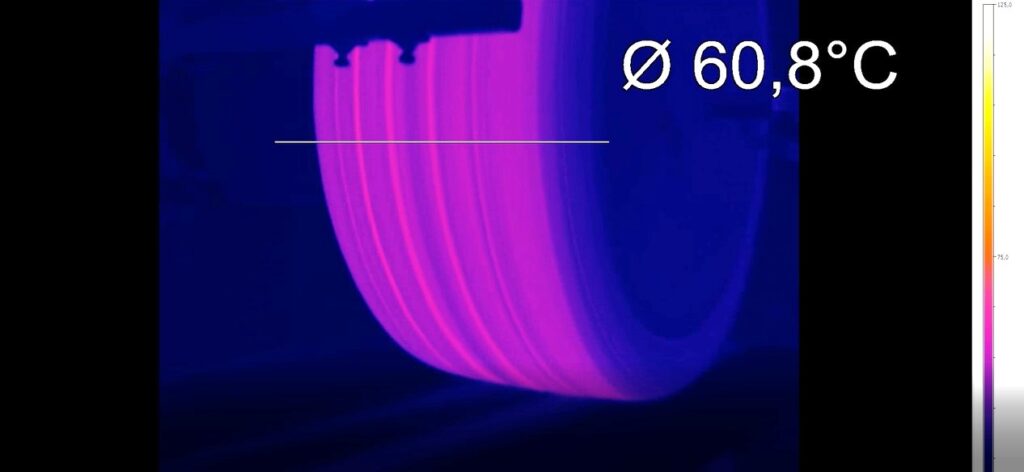Introducing temperature and velocity dependent tire modeling


With release 2020.2 the Simcenter Tire team introduces the explicit modeling of the effects of temperature and velocity on the tire performance. This further increases applicability and accuracy of the tire model in vehicle simulations ranging from handling to durability.
Applicability and impact of tire modeling on vehicle dynamics
Tire performance is known to be highly dependent on the tire thermal state and its forward velocity. Important passenger car tire characteristics as the cornering stiffness and peak friction may vary up to as much as 20% as a function of T&V throughout their normal operating window. In order to describe the impact of these effects on the vehicle dynamics, Siemens presented a scientific paper at the 2020 SAE World Congress: “A Study on the Effect of Tire Temperature and Rolling Speed on the Vehicle Handling Response”
The study shows that the tire temperature and rolling speed have a significant influence on the vehicle dynamic response. MF-Tyre/MF-Swift 2020.2 contains a Magic Formula based tire modeling approach which allows you to explicitly model these effects and:
- Increase the simulation fidelity for maneuvers throughout which the tire temperature and/or velocity changes (e.g. ABS, ESC or laptime simulations)
- Change tire initial thermal state from one simulation to the other, for example to investigate the influence of seasonal conditions on vehicle performance
Further, this release allows to use one single model for both soft handling as well as extreme handling maneuvers and therefore avoids dedicated tire testing and parameterization for these specific maneuvers.
Tire Modeling approach; modularity, Real-Time capability and transparency
This release builds further on the modular tire modeling approach. End users can activate the extension in order to include the T&V effects. When the extension is deactivated the original MF-Tyre/MF-Swift model behavior remains. Moreover, already existing tire parameter sets can be easily extended with the T&V module parameters.
MF-Tyre/MF-Swift excels in balancing model complexity and fidelity. Together with Pirelli and the passenger car OEM partners this has also been the focus throughout the model developments. The T&V model extension therefore provides a high level of accuracy but yet requires minimal additional computational effort and is fully Real-Time capable.
In line with its philosophy, the Simcenter Tire team chooses an as transparent as possible modeling approach. A scientific paper was published at the 2020 JSAE spring congress, explaining the most important model assumptions, the modeling approach and the additionally required parameters and their effect. Further details are presented in this paper: “A Tire Model Extension for Predicting Temperature and Rolling Speed Influences on Tire Performance”
Tire testing protocol and model parameterization
A new tire modeling feature is not complete without a standardized tire testing and model parameterization approach. The Temperature and Velocity protocol is designed to identify all required model parameters with as little testing effort as possible. The protocol supports industry standard test rigs such as MTS Flat-Trac and Tire Test Trailers. Only internal and external tire temperature sensors are required in addition to the default force and moment measurement signals. The protocol can be directly shared in order to support in-house tire testing and model parameterization with MF-Tool.
Product compatibility and availability
MF-Tyre/MF-Swift v2020.2 also introduces the compatibility with National Instruments PXI real-time computers. The release is currently available in combination with Matlab and MSC Adams. Throughout the coming months MF-Tyre/MF-Swift v2020.2 will also be available with other partner packages.


